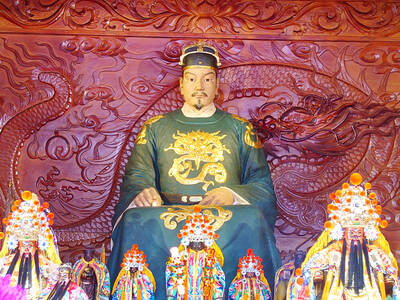The Air I Breathe is an ingenious contraption that holds your attention for as long as it whirs and clicks like a mechanized Rubik’s Cube. After it’s over, however, you may find yourself scratching your head and wondering if there was any purpose to this sleek little gizmo.
The debut feature of Jieho Lee, a Korean-American director and screenwriter who, in the production notes, calls it a reflection of his “journey as an Asian-American” in a “bimodal world,” The Air I Breathe smothers in its own pretensions. Among other things, Lee declares, it is a film noir variation of The Wizard of Oz and an exploration of the theme of character as destiny. Whew! That’s an awful lot of concepts for one movie to juggle.
A hard-boiled allegory that consists of four vignettes whose characters bleed from one episode into the next, the film was inspired by a Chinese proverb that divides life into four categories: happiness, sorrow, pleasure and love. Three of the four vignettes feature an unnamed character, portrayed by a star, who represents one of the basic feelings. (But what about anger, an emotion that is plentiful in a movie with very little pleasure and little or no genuine happiness?)
What unfolds is a flashy example of the everything-is-connected mode of filmmaking embodied by movies like Short Cuts, Crash and Babel, but the connections in The Air I Breathe are paradoxical philosophic abstractions lacking geographic and cultural resonance. In the first episode, “Happiness,” Forest Whitaker — playing against type as a cowering milquetoast with a low-level banking job — overhears his colleagues planning to bet on a rigged horse race. Impulsively betting his life savings, he runs afoul of the scheme’s mastermind, Fingers (Andy Garcia), a gangster who mutilates debtors’ hands; his only hope of avoiding that fate is to rob a bank.
In “Pleasure,” Fingers’ soft-spoken hit man (Brendan Fraser) is instructed to take his boss’s hotheaded young nephew Tony (Emile Hirsch) out on the town and show him the ropes. While night crawling, the henchman, whose talent for seeing into the future is prized by his employer, has ominous flashes of how the evening will end; unexpectedly, his visions don’t pan out. Rid of a gift that has also been a curse, he experiences the same giddy sense of liberation as Whitaker’s reckless gambler and bank robber.
In “Sorrow,” Sarah Michelle Gellar plays Trista, aka Sorrow, a terrorized pop star who becomes Fingers’ property after he buys her contract to settle a debt. Fraser’s character, a thug with a soft spot, impulsively hides her from Fingers and falls in love with her against his better judgment.
“Love,” the final episode, stars Kevin Bacon as a doctor who desperately tries to save the love of his life (Julie Delpy) — who happens to be his best friend’s wife — after she is bitten by a poisonous snake and requires a transfusion of a rare blood type. Circular in structure, the movie, to make its final connection, returns to Whitaker’s character in a delirious life-or-death moment.
The film’s most fully realized characters are Garcia’s cold-blooded killer (this is his strongest screen performance in years) and Hirsch’s gun- and girl-crazy nephew. Because Fingers pulls the plot strings in all four vignettes, The Air I Breathe ultimately registers as a gangster movie with delusions of grandeur.

On a harsh winter afternoon last month, 2,000 protesters marched and chanted slogans such as “CCP out” and “Korea for Koreans” in Seoul’s popular Gangnam District. Participants — mostly students — wore caps printed with the Chinese characters for “exterminate communism” (滅共) and held banners reading “Heaven will destroy the Chinese Communist Party” (天滅中共). During the march, Park Jun-young, the leader of the protest organizer “Free University,” a conservative youth movement, who was on a hunger strike, collapsed after delivering a speech in sub-zero temperatures and was later hospitalized. Several protesters shaved their heads at the end of the demonstration. A

In August of 1949 American journalist Darrell Berrigan toured occupied Formosa and on Aug. 13 published “Should We Grab Formosa?” in the Saturday Evening Post. Berrigan, cataloguing the numerous horrors of corruption and looting the occupying Republic of China (ROC) was inflicting on the locals, advocated outright annexation of Taiwan by the US. He contended the islanders would welcome that. Berrigan also observed that the islanders were planning another revolt, and wrote of their “island nationalism.” The US position on Taiwan was well known there, and islanders, he said, had told him of US official statements that Taiwan had not

The term “pirates” as used in Asia was a European term that, as scholar of Asian pirate history Robert J. Antony has observed, became globalized during the European colonial era. Indeed, European colonial administrators often contemptuously dismissed entire Asian peoples or polities as “pirates,” a term that in practice meant raiders not sanctioned by any European state. For example, an image of the American punitive action against the indigenous people in 1867 was styled in Harper’s Weekly as “Attack of United States Marines and Sailors on the pirates of the island of Formosa, East Indies.” The status of such raiders in

As much as I’m a mountain person, I have to admit that the ocean has a singular power to clear my head. The rhythmic push and pull of the waves is profoundly restorative. I’ve found that fixing my gaze on the horizon quickly shifts my mental gearbox into neutral. I’m not alone in savoring this kind of natural therapy, of course. Several locations along Taiwan’s coast — Shalun Beach (沙崙海水浴場) near Tamsui and Cisingtan (七星潭) in Hualien are two of the most famous — regularly draw crowds of sightseers. If you want to contemplate the vastness of the ocean in true